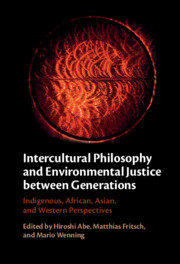 Intercultural Philosophy and Environmental Justice between Generations
Intercultural Philosophy and Environmental Justice between Generations Book contents
- Intercultural Philosophy and Environmental Justice between Generations
- Intercultural Philosophy and Environmental Justice between Generations
- Copyright page
- Contents
- Contributors
- Acknowledgments
- Introduction
- Part I Indigenous Philosophies on Justice between Generations
- Part II Intergenerational Ethics in Dialogue with Confucianism and Daoism
- 5 Ghosts and Intergenerational Justice
- 6 Intergenerational Ethics and Sustainability
- 7 Moral Motivation for Future Generations, Naturally
- 8 Transience, Responsible Transformation, and Deep Time in Daoist Thought
- Part III Humanity Facing the Near Environmental Future
- Index
- References
8 - Transience, Responsible Transformation, and Deep Time in Daoist Thought
from Part II - Intergenerational Ethics in Dialogue with Confucianism and Daoism
Published online by Cambridge University Press: 14 March 2024
- Intercultural Philosophy and Environmental Justice between Generations
- Intercultural Philosophy and Environmental Justice between Generations
- Copyright page
- Contents
- Contributors
- Acknowledgments
- Introduction
- Part I Indigenous Philosophies on Justice between Generations
- Part II Intergenerational Ethics in Dialogue with Confucianism and Daoism
- 5 Ghosts and Intergenerational Justice
- 6 Intergenerational Ethics and Sustainability
- 7 Moral Motivation for Future Generations, Naturally
- 8 Transience, Responsible Transformation, and Deep Time in Daoist Thought
- Part III Humanity Facing the Near Environmental Future
- Index
- References
Summary
Daoist philosophy takes as axiomatic that the constant transformation of things in the world is not to be deprecated, but rather celebrated as the basis for the mutual flourishing of the myriad things. This view contains both cyclical and linear conceptions of time and is predicated on a view of a porous body that does not simply occupy blank space or time, but rather is transformed by and also transforms space and time. The porosity and pliability of our cosmos suggests that we should value what is soft and weak rather than what is conventionally hard and strong. This leads to the formulation of an ethic of “plasticity” that governs our responsible engagement with our planetary context.
- Type
- Chapter
- Information
- Intercultural Philosophy and Environmental Justice between GenerationsIndigenous, African, Asian, and Western Perspectives, pp. 153 - 164Publisher: Cambridge University PressPrint publication year: 2024
